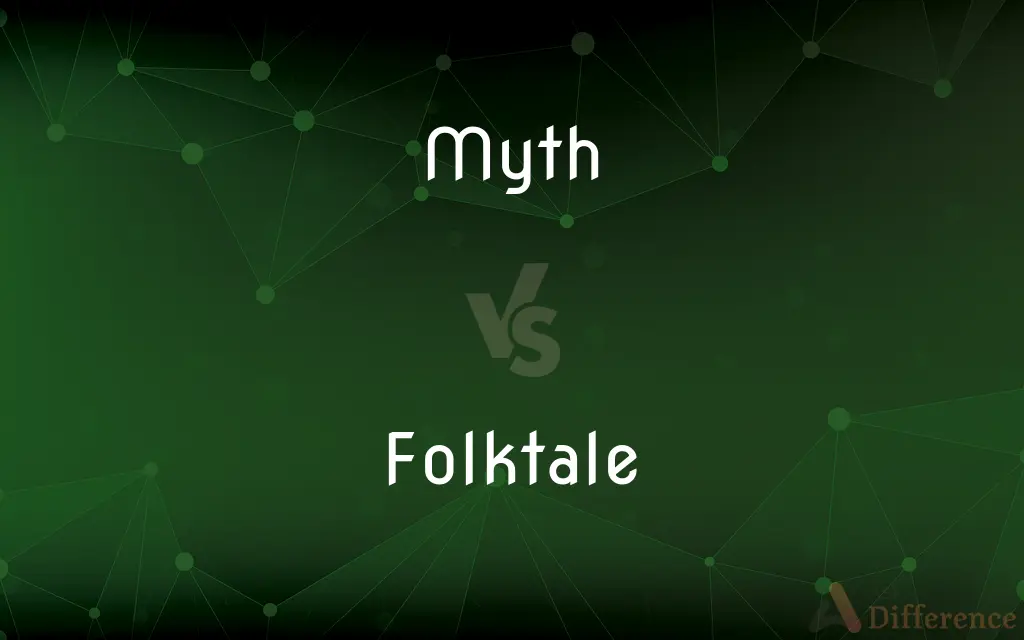Myth vs. Folktale — What's the Difference?
By Tayyaba Rehman — Updated on September 20, 2023
A myth is a traditional story that explains natural phenomena or cultural beliefs, often involving gods or supernatural beings. A folktale is a traditional narrative passed down orally, generally involving common people and moral lessons.

Difference Between Myth and Folktale
Table of Contents
ADVERTISEMENT
Key Differences
A myth is a type of story that often serves to explain some aspect of the natural world or cultural beliefs and practices. These stories frequently involve gods, goddesses, or other supernatural entities. On the other hand, a folktale is a traditional story that has been passed down through generations, usually orally. Folktales often involve ordinary people rather than gods and may or may not carry a moral lesson.
Myths often serve a more functional purpose within a culture, often serving to justify or explain customs, traditions, or societal structures. Folktales, by contrast, often serve the purpose of entertainment, though they may also impart moral or life lessons. While myths usually have a more sacred or revered status, folktales are often viewed as more casual forms of storytelling.
In terms of origins, myths often stem from religious or cultural traditions and may be considered true or sacred by people within those traditions. Folktales have a more secular origin, typically passed down through storytelling among the common people. They are not considered to be religious texts and may even be viewed as fictional stories.
The characters involved in myths and folktales also differ significantly. In myths, the characters are often gods, goddesses, or other supernatural beings, while in folktales, they are usually common people, animals, or sometimes mythical creatures. Both myths and folktales are important elements of cultural heritage, serving different but complementary roles.
Comparison Chart
Purpose
Explains natural/cultural phenomena
Entertainment or moral lessons
ADVERTISEMENT
Characters
Gods, goddesses, supernatural beings
Common people, animals
Origin
Religious/cultural traditions
Oral storytelling among common people
Status
Often revered or considered true
Generally considered as stories, not factual
Function
Justifies or explains cultural aspects
Provides moral or life lessons
Compare with Definitions
Myth
A tale explaining cultural beliefs or customs.
The myth of the Dreamtime is important in Australian Aboriginal culture.
Folktale
A story passed down orally over generations.
The folktale of Cinderella has numerous versions.
Myth
Fictional stories involving supernatural elements.
The myth of Atlantis captivates many even today.
Folktale
A non-religious story from cultural traditions.
The folktale of Anansi is popular in West African culture.
Myth
Narratives foundational to a culture or religious practice.
The myths in the Bible are foundational to Christianity.
Folktale
A narrative usually involving common people or animals.
In the folktale 'The Tortoise and the Hare,' a tortoise wins the race.
Myth
Myth is a folklore genre consisting of narratives that play a fundamental role in a society, such as foundational tales or origin myths. The main characters in myths are usually non-humans, such as gods, demigods, and other supernatural figures.
Folktale
A tale often told for entertainment or cultural preservation.
Folktales have been used to keep cultures alive through storytelling.
Myth
A traditional, typically ancient story dealing with supernatural beings, ancestors, or heroes that serves as a fundamental type in the worldview of a people, as by explaining aspects of the natural world or delineating the psychology, customs, or ideals of society
The myth of Eros and Psyche.
A creation myth.
Folktale
A traditional story often with a moral lesson.
The folktale 'The Boy Who Cried Wolf' teaches honesty.
Myth
Such stories considered as a group
The realm of myth.
Folktale
A story or legend forming part of an oral tradition.
Myth
A popular belief or story that has become associated with a person, institution, or occurrence, especially one considered to illustrate a cultural ideal
A star whose fame turned her into a myth.
The pioneer myth of suburbia.
Folktale
A tale or story that is part of the oral tradition of a people or a place.
Myth
A fiction or half-truth, especially one that forms part of an ideology.
Folktale
A tale circulated by word of mouth among the common folk, especially one forming part of the tradition of a culture.
Myth
A fictitious story, person, or thing
"German artillery superiority on the Western Front was a myth" (Leon Wolff).
Folktale
A tale circulated by word of mouth among the common folk
Myth
A traditional story which embodies a belief regarding some fact or phenomenon of experience, and in which often the forces of nature and of the soul are personified; a sacred narrative regarding a god, a hero, the origin of the world or of a people, etc.
Myth
(uncountable) Such stories as a genre.
Myth was the product of man's emotion and imagination, acted upon by his surroundings. (E. Clodd, Myths & Dreams (1885), 7, cited after OED)
Myth
A commonly-held but false belief, a common misconception; a fictitious or imaginary person or thing; a popular conception about a real person or event which exaggerates or idealizes reality.
Scientists debunk the myth that gum stays in the human stomach for seven years.
Myth
A person or thing held in excessive or quasi-religious awe or admiration based on popular legend
Father Flanagan was legendary, his institution an American myth. (Tucson (Arizona) Citizen, 20 September 1979, 5A/3, cited after OED)
Myth
A person or thing existing only in imagination, or whose actual existence is not verifiable.
Myth
An invented story, theory, or concept.
Myth
A story of great but unknown age which originally embodied a belief regarding some fact or phenomenon of experience, and in which often the forces of nature and of the soul are personified; an ancient legend of a god, a hero, the origin of a race, etc.; a wonder story of prehistoric origin; a popular fable which is, or has been, received as historical.
Myth
A person or thing existing only in imagination, or whose actual existence is not verifiable.
As for Mrs. Primmins's bones, they had been myths these twenty years.
Myth
A traditional story accepted as history; serves to explain the world view of a people
Myth
A story involving gods to explain natural or societal phenomena.
The myth of Prometheus explains how fire came to humans.
Myth
A traditional narrative often considered sacred.
In Greek mythology, the myth of Zeus is central.
Common Curiosities
Are folktales considered true?
Folktales are generally considered to be stories and are not presented as factual accounts.
What is a myth?
A myth is a traditional story often involving gods or supernatural beings to explain natural or cultural phenomena.
What is the main purpose of a myth?
The main purpose is to explain natural phenomena, cultural beliefs, or societal structures.
Who are the typical characters in folktales?
Characters in folktales are usually common people or animals.
What is a folktale?
A folktale is a story passed down through generations, usually orally, often involving common people and sometimes moral lessons.
Are folktales religious texts?
Folktales are not generally considered religious texts.
What is the main purpose of a folktale?
The main purpose is often entertainment, though they may also impart moral or ethical lessons.
Who are the typical characters in myths?
Characters in myths are often gods, goddesses, or other supernatural beings.
Are myths considered true?
Within the cultures that produced them, myths are often revered and may be considered true.
Do myths contain moral lessons?
While not their primary purpose, myths can sometimes contain moral or ethical teachings.
Do folktales contain moral lessons?
Many folktales contain explicit moral or ethical lessons.
Are myths religious texts?
Myths may be considered religious texts within the cultures that hold them.
Where do myths originate?
Myths often originate from religious or cultural traditions.
Where do folktales originate?
Folktales usually originate from oral storytelling among common people.
How are myths and folktales passed down?
Both can be passed down orally, though myths are more likely to be written down and considered sacred texts.
Share Your Discovery

Previous Comparison
Subject vs. Predicate
Next Comparison
Mamaw vs. MeemawAuthor Spotlight
Written by
Tayyaba RehmanTayyaba Rehman is a distinguished writer, currently serving as a primary contributor to askdifference.com. As a researcher in semantics and etymology, Tayyaba's passion for the complexity of languages and their distinctions has found a perfect home on the platform. Tayyaba delves into the intricacies of language, distinguishing between commonly confused words and phrases, thereby providing clarity for readers worldwide.














































